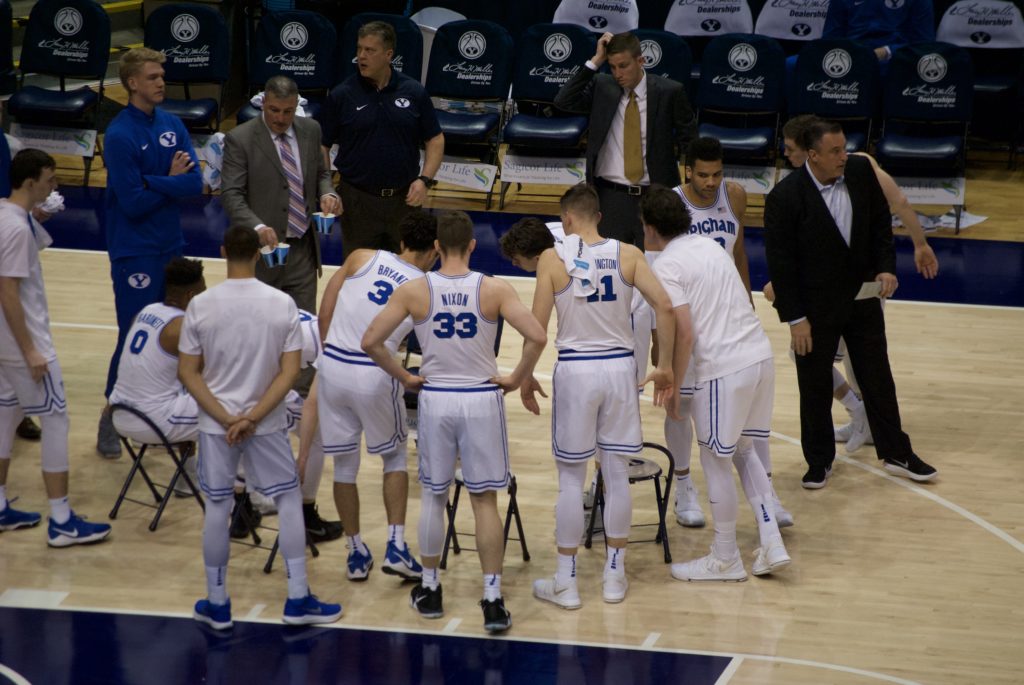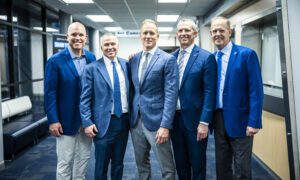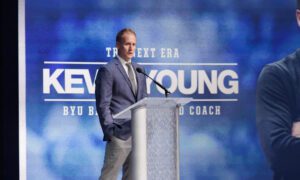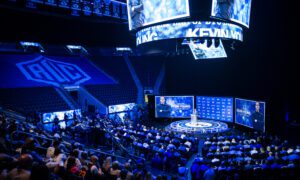
The 2018-19 BYU Basketball season will be an important one for the Cougar Cagers
By: ESPN 960’s Ben Criddle, Darnell Dickson from the Provo Daily Herald
In 2005, the BYU men’s basketball team was coming off a disappointing 9-21 record. Steve Cleveland, who had rebuilt the Cougars after the dreadful 1-25 season of 1997, decided to return to his roots and left to take over the Fresno State program. BYU Director of Athletics Tom Holmoe then handed eight-year assistant Dave Rose his first Division I head coaching job.
What followed over the next 13 years has been remarkably consistent in terms of wins. With 329 victories, Rose is a couple of seasons away from passing Stan Watts (371 victories) as the winningest basketball coach in school history. Less satisfying to BYU fans is the lack of conference championships and NCAA Tournament appearances.
Rose should be viewed as one of the best, if not THE best, coach in BYU basketball history. But three straight seasons without an NCAA Tournament bid has a portion of the fanbase wondering if the program should make a change.
Is their concern warranted? Or is this a case of “be careful what you wish for?”
Former BYU defensive back Ben Criddle is the host of a four-hour weekday radio program on ESPN960 that discusses all things Cougar. He compiled a side-by-side comparison between Rose’s 13 years at the helm and the 13 years prior to his tenure. We endeavored to take a look at the data and draw some conclusions.
The numbers
In nearly every way, Rose’s 13-year record tops the 13 years prior to his tenure.
Wins: 329-123 record (.728) for Rose, 223-175 (.560) before
Home record: 187-23 (.890) for Rose, 144-76 (.760) before
Conference titles: 4 for Rose, 2 before
Post-season appearances: 13 for Rose (8 NCAA, 5 NIT), 8 before (5 NCAA, 3 NIT)
Post-season victories: 10 for Rose (4 NCAA, 6 NIT), 5 before (1 NCAA, 4 NIT)
The biggest hole in Rose’s resume is that he has never won a conference tournament title in his 13 years at the helm. The last BYU team to win a conference tournament was the 2002 group in the Mountain West Conference.
Conclusions
Wins: While Rose clearly has won a lot of games, the target has risen for mid-majors if your name isn’t Gonzaga. Very clearly, the NCAA is sending a message that piling up a bunch of wins against mediocre opponents isn’t going to earn you a tournament bid. See Saint Mary’s, which rolled up 28 regular-season wins last season but was not awarded a spot.
BYU has averaged better than 20 regular-season wins the past three years but has been relegated to the NIT each time. And two of those seasons included a road win at nationally-ranked Gonzaga.
In 2018, only 10 of the 36 at-large NCAA Tournament invites went to teams from mid-major conferences. The mid-majors who did make the tournament made noise. Maryland-Baltimore County became the first 16-seed to knock off a 1-seed (Virginia) and tourney runs by Nevada and Loyola-Chicago captured the hearts of college basketball fans everywhere.
Conference affiliation matters: BYU was a force in the MWC, winning or sharing three straight regular-season titles and four overall under Rose. The Cougars have been far a bit unlucky in the West Coast Conference, largely due to the Gonzaga and Saint Mary’s having their best teams. The biggest problem for BYU in the WCC hasn’t actually been the Bulldogs and the Gaels; it’s been puzzling and untimely losses to low RPI teams.
Trends: Rose was 47-1 in his first 48 home games at BYU, turning the Marriott Center into one of the most feared home courts in the country. While the Cougars overall home record over Rose is still outstanding – 89 percent — Rose is 43-9 (82 percent) in the past three seasons in the MC. BYU hasn’t defeated Gonzaga in the Marriott Center since 2014.
Six of Rose’s eight NCAA Tournament appearances came in his first seven seasons. In the next six seasons, there have been only two – both in the First Four.
NCAA Tournament wins are rare and precious, both before and during Rose’s tenure. Three of Rose’s four NCAA wins came during Jimmer Fredette’s junior and senior season, so only one non-Jimmer NCAA victory (in 2011-12).
The post-season ceiling for Rose’s teams without Fredette have been barely making it to the NCAA Tournament or an NIT run, and that doesn’t sit well with BYU fans.
Rose has never been shy about delegating responsibility to his assistant coaches. During the Fredette years, Dave Rice called the BYU offensive sets. Mark Pope, Terry Nashif and most recently Heath Schroyer have been very active in game-time decisions on offense and defense whereas Rose has spent the bulk of his coaching in preparing game plans and working on substitution patterns. How will Rose divvy up responsibility with his current staff, which includes Tim LaComb, Quincy Lewis, and Lee Cummard, in his first year as a full-time assistant?
Losing Eric Mika and Elijah Bryant have been significant blows to BYU’s personnel and a constant stream of transfers has been a struggle. But Yoeli Childs and Nick Emery return to the roster in 2018-19 and give the Cougars some firepower. Rose would like to rely on seniors so the team can “get old” – Cummard, Fredette, Jackson Emery, Noah Hartsock, Tyler Haws, Chase Fischer and Kyle Collinsworth come to mind as examples – but early departures have made that difficult. The current roster configuration leaves on open scholarship since Payton Dastrup transferred. That scholarship could be given to former walk-on McKay Cannon.
The future: Will the Cougars ever get to that next level? What would that next level be?
The first order of business for Rose and his staff should be to make the Cougars a regular visitor to the NCAA Tournament. That means beating Gonzaga and Saint Mary’s on a more regular basis – especially in the WCC Tournament — and having fewer puzzling losses to the lower-level WCC teams. A preliminary peek into the 2018-19 non-conference schedule indicates the Cougars are trying to up the ante. Games are scheduled at Houston, Nevada, Mississippi State and Utah (Beehive Classic at Vivint Smart Home Arena) with more to come.
*******
THE SCHEDULE
Nevada
Date: November 6th, 2018
Location: Lawlor Events Center (Reno, NV)
Final 2018 RPI Ranking: 13 (Quadrant 1)
Utah (Beehive Classic)
Date: December 8th, 2018
Location: Vivint Smart Home Arena (Salt Lake City, UT)
Final 2018 RPI Ranking: 40 (Quadrant 1)
UNLV
Date: December 15th, 2018
Location: T-Mobile Arena (Las Vegas, NV)
Final 2018 RPI Ranking: 132 (Quadrant 3)
San Diego State
Date: December 22nd, 2018
Location: Viejas Arena (San Diego, CA)
Final 2018 RPI Ranking: 64 (Quadrant 1)
Mississippi State
Date: December 29th, 2018
Location: Humphrey Coliseum (Starkville, MS)
Final 2018 RPI Ranking: 55 (Quadrant 1)
Houston
Date: TBA
Location: Marriott Center
Final 2018 RPI Ranking: 20 (Quadrant 1)
Illinois State
Date: TBA
Location: Redbird Arena (Normal, IL)
Final 2018 RPI Ranking: 83 (Quadrant 2)
Utah Valley
Date: TBA
Location: Marriott Center
Final 2018 RPI Ranking: 91 (Quadrant 3)
Utah State
Date: TBA
Location: Marriott Center
Final 2018 RPI Ranking: 157 (Quadrant 3)
Weber State
Date: TBA
Location: Dee Events Center (Ogden, UT)
Final 2018 RPI Ranking: 158 (Quadrant 3)
THE ROSTER
Luke Worthington – Senior
McKay Cannon – Senior
Nick Emery – RS-Junior
Jahshire Hardnett – RS-Junior
Yoeli Childs – Junior
Dalton Nixon – Junior
Zac Seljaas – Junior
TJ Haws – Junior
Ryan Andrus – RS-Sophomore
Rylan Bergersen – Sophomore
Kolby Lee – RS-Freshman
Gavin Baxter – Freshman
Connor Harding – Freshman
Questionable
Braiden Shaw – RS-Junior
Gone
Elijah Bryant
Payton Dastrup
ESPN 960’s Mitch Harper also contributed to this article








